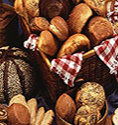A review of studies on soy isoflavones, estrogen therapy use and breast cancer risk suggests that there is no evident link between isoflavones and breast cancer risk in heathy women or breast cancer patients. This was reported in the Journal of Nutrition, June 2008 issue, by co-authors Mark Messina of Nutrition Matters Inc. and Charles Wood of Wake Forest University, USA.
Isoflavones are phytoestrogens, plant chemicals with similar chemical structure and property as estrogens. Soy foods (soy beans, tofu, soy milk etc) are major sources of isoflavones.
Endogenous estrogens are known for their role in the origin of breast cancer, even though the role of exogenous estrogens is not evident.
The role of isoflavones on breast cancer is controversial. On one hand, there is an expert view that argues soy isoflavones may potentially reduce risk of breast cancer. This is based on: (1) the association between low breastcancer incidence among Asian women and their high soy isoflavone consumption (25 - 50 mg/day); (2) human survey and animal experiments that showed protective benefits of soy against cancerous cells in the lab. Among the supporters of this argument is the American cancer Society, which advised, in 2006, breast cancer patients can safely consume upto three servings of soy foods per day. The Society, however, advises against the use of more concentrated sources of isoflavones such as powders and supplements.
On the other hand, there is a concern that isoflavones may worsen breast cancer. The basis for this is the fact that isoflavones act like estrogen, that is, they bind to estrogen-receptors and exhibit weak estrogenic effects. Besides, some studies on mice demonstrated that isoflavones had estrogenic effects on reproductive tissues.
The authors reviewed literature to address the controversy sarrounding isoflavones and their role on breast cancer, in light of estrogen therapy use in postmenopausal women. All in all, they referred about 130 scientific reports including on animal studies, clinical trials, and epidemological studies. According to their analysis, there is no sufficient data to support intake of isoflavones from dietary sources or as supplements (<100 mg isoflavones per day) increases breast cancer risk or interferes with recovery from breast cancer. They, however, pointed out that a study on mice showed that genistein, one of the isoflavones, may interfere with concurrent tamoxifen treatment, suggesting that breast cancer patients taking SERM should limit soyfood intake and avoid isoflavone supplements.
The authors underscored that so far documented clinical trials are based on small study subjects and limited in scope and therefore more studies are needed to definetly clear isoflavones from the controversy sarrounding them.
Source:
Messina, M. J., Wood, C. E. Soy isoflavones, estrogen therapy, and breast cancer risk: Analysis and commentary. Nutrition Journal, June 2008, 7:17.



